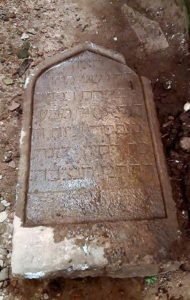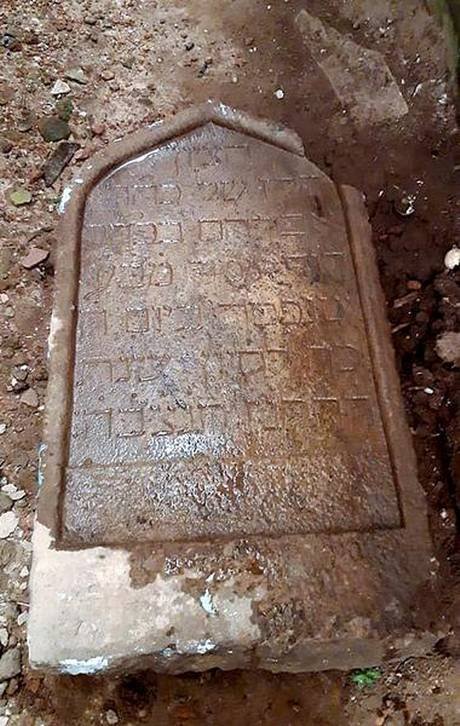
Centuries-old tombstones of members of Jewish community lie buried within houses built over them in Mattancherry
With centuries-old tombstones of members of the Jewish community lying buried within houses built over them a few decades ago, a crumbling Kadavumbhagam synagogue and the dwindling number of Jews in Mattancherry, ‘Jew Town’ may soon be a misnomer.
Visits to some of the houses on an acre of land near the Kadavumbhagam synagogue revealed tombstones inscribed in Hebrew lying in the mud or propped up against walls, said Thoufeek Zakariya, a Hebrew calligrapher with an interest in Jewish history. Mr. Zakariya along with Thaha Ibrahim, who runs Sarah Cohen’s store in Mattancherry, unearthed a few stones in the past few weeks. Few residents were aware of the significance of the stones and that their houses were built over a Jewish cemetery, said Mr. Zakariya.
As per Mr. Zakariya’s reading of the stones, some of them date back to the 17th and 18th centuries. “Some tombstones could even go back further since the Kadavumbhagam and Thekkumbhagam synagogues were built by the Malabari Jews in Mattancherry before the 16th century,” said Mr. Zakariya. The cemetery is likely to have belonged to the Malabari Jews who buried their dead separately from the Paradesi Jews. The Paradesi cemetery still stands a little distance from the Kadavumbhagam synagogue.
When the congregations of the Mattancherry Thekkumbhagam and Kadavumbhagam synagogues moved to Israel in 1956, they left the synagogues and the cemetery with Satu Koder, a scion of the Koder family, said Ellias Josephai, caretaker of the Kadavumbhagam synagogue near Broadway. With the land reforms of the first communist government, people in the area would have taken over the cemetery, said Mr. Josephai.
In private hands
According to an official at the State Department of Archaeology, the properties owned by the Malabari Jewish community in Mattancherry are possibly the only historically significant structures in the State to have fallen into private hands.
“The synagogues in Chendamangalam and Mala were owned by the community. When they left, they handed the Mala synagogue over to the panchayat. The Mattancherry Kadavumbhagam synagogue has changed hands multiple times in the past few decades,” said the official.
The department is shelling out a little over ₹91 lakh to acquire the property from its current owners.
According to Mr. Zakariya, the tombstones could be unearthed and preserved without disturbing the inhabitants of the area.
Uncertain histories
Remnants of Jewish history in the city are few today, despite their centuries-long presence.
In 1961, parts of the Thekkumbhagham synagogue, which lies opposite Sarah Cohen’s house and is now privately owned, were sold to a museum in the USA. The interiors of the Mattancherry Kadavumbhagam synagogue were also sold to the Israel Museum in Jerusalem, said Mr. Josephai.
The Malabari Jewish cemetery near Broadway was taken over by the Department of Archaeology a few years ago. Though initial conservation work had begun, no progress had been made after that, said the official at the department. The department and the ASI are undecided over which of them must protect the Thekkumbhagam synagogue near Broadway.
The copper plates given to the Jewish trader Joseph Rabban in the 1st century AD by Chera ruler Bhaskara Ravi Varma at Muziris gave the community privileges and is preserved at the Paradesi synagogue at Mattancherry. The synagogues, the plates and a few Dutch documents, could be the only tangible record of Jewish presence, said historian K.S. Mathew. Writing of their history would depend on the chronicles of the few members of the community in Kochi.
The Thekkumbhagam and Kadavumbhagam synagogues had a few records documenting the lives of the Jews, but their location at present was uncertain, said Scaria Zacharia, some of whose research has focussed on the Jewish community.
The lack of records means that the dates of the structures and of Jewish arrival in Kochi is uncertain.
Israeli tourists
But Israeli tourists continue to visit the city for its few vestiges of Jewish history. Kerala saw 15,339 visitors from Israel in 2018, a jump from 11,892 in 2017, according to an official at the Department of Tourism.
